The End of the World is Nigh
Are you sitting comfortably? Then I’ll begin.
This is a Long Read.
In March of 2019, Nick and I celebrated 30 years of living the liveaboard life together – but, in fact, on the anniversary of the day that we joined forces and embarked, we were not actually living afloat; we were hanging out on a hillside in Iberia. We had left the boat and gone there in order to save the world.
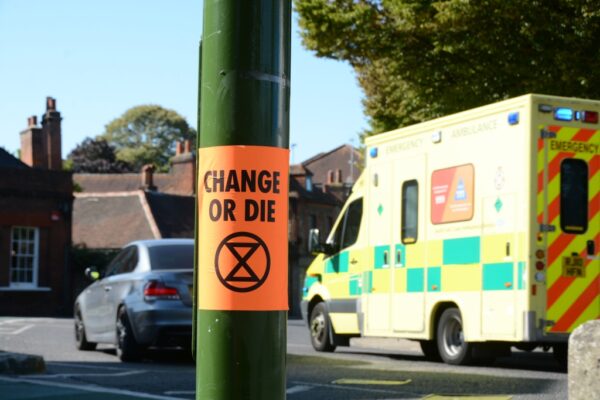
Before I met him, Nick had already put a girdle around the Earth and had then crossed the Pacific and the Atlantic several times more, but after we met he decided to take a very much more relaxed approach to life. Thus it is that during our 30 years of cruising together we have not travelled far. Bumbling to and fro, from north to south and east to west, we have visited palm-fringed coral islands and calving glaciers; we have seen elephants and penguins, whales and phosphorescent plankton; we have raised three kids, wrecked a boat in a storm, built a new one, and rounded two of the three Great Capes – but, to be honest, anyone with the inclination could have done as much as this in the time available, and many of our friends have done far more. One friend has been five times round the world in not much more than four decades. Indeed, he went once around the world while we Mollymawks were faffing about, just getting from one side of South America to the other.
Considering how little Nick and I achieved in those three decades of living aboard and how few were the miles that we covered, I am astonished when I look back over the past twelve months and see how much we managed to pack in when we set aside the adventure and set out to save the world.
The problem is that during the past 30 years while Nick and I have been crawling about on the surface of the world, pretty much ignoring its other occupants, the place has been gradually falling into disrepair.
I think it was in ’88 that I first heard about Global Warming. Up until that time I’d been steadfastly keeping out of mainstream society simply because I abhorred it. From my infancy I had hated cars, partly on account of the noise and smell that they make but moreso because they need roads – and roads tear apart the countryside. When I grew a little bit older and learned about pollution, I also became a big fan of wind power and solar energy, and I tried to persuade my dad to put panels on the roof of our house – but all in vain. More than anything, however, from my earliest infancy I simply hated the entire ethic of modern life. As a teenager I tried to persuade my parents to sell their suburban house and buy a piece of land on a mountainside in Wales. There, we could subsist happily.
Derisive snorts greeted this suggestion and there was mention of subsiding rather than subsisting. I would hate it, I was told. I was far too lazy to live off the land.
My dad’s dad started out as a coal miner, just like his own dad before him, but the old man had risen from this deep, dark grave to become a shoemaker. And my dad had risen even further and got himself an office job. The next generation were now expected to go higher still. We must go to university and get degrees, and then we would be able to get wonderful jobs.
Terrific! Life reached ahead of me: I would work from nine to five, five days a week, so that I could earn enough money to pay the mortgage and keep on doing that job. Live to work to live to work to live to work to live… and then you die.
“What’s the point in that, Mum?”
“No point! It’s just the way it is! It’s just life.”
Not for me. I would sooner be dead than live that way.
Happily, I had one talent which I loved to use – I had been gifted with the ability to draw and paint – and so I was able, as I used to say, to mint my own money. When the mooring fees for my little boat were due, I would sell a couple of watercolours; when I needed a meal, someone would surely want an illustration; and when I wanted to fly to Canada and back, to spend a year back-packing, there were always businesses needing commercial artwork.
I was a drop-out living on the periphery of society, disdaining its bricks and mortar, mortgages, income tax, and highways, but feeding on its inhabitants. Well, what else can you do, eh?
And then I met someone who seemed to have managed to escape altogether from the ants’ nest.
I met Nick.
Nick had arrived at a similar outlook on life from an entirely different direction – and he had already got himself a boat suitable for crossing oceans, whereas my abode was ditch-crawler. Indeed, as I have said, Nick had already been crossing oceans for a decade. There was only one area in which I was ahead of this expert vagabond, and that was with regard to environmental concerns.
Having cast off the mooring lines and dropped all ties with the shore, when I met him Nick knew nothing about the problems facing the world. I can distinctly recall pointing out the map which was pinned to the wall of my studio: a map supplied by Greenpeace, detailing the way in which the oceans and the land would warm as the upper atmosphere became filled with carbon gases. This was all news to Nick; but unlike my parents – unlike pretty much anyone else I’d ever met – he didn’t need telling twice or having his arm twisted. After listening to my words he just said, “Well if we mustn’t run the engine any more to charge the batteries, we’ll have to buy a wind generator.”
We got rid of the boat’s fridge, because it needed the power of the engine, and we became scrupulous about turning off the lights to save the power garnered by our new generator, sited at the masthead. I had always regarded motoring as a cop-out – a keen sailor himself, my dad had raised me to believe that the use of the engine betrayed an inability to handle the boat properly under sail – but according to the new regime, motoring now became utterly taboo. Since Nick was a mechanic, the beast in the bilge was his cherished friend, but even so, its use was now reserved exclusively for tight corners and emergencys.
When we started a family, our children grew up with the same attitudes as we, for they were taught to read from books such as The Lorax. They understood that the world is fragile and that we have to take care of it. Nor was this knowledge only theoretical, for the kids wore second-hand clothes and played with toys made by their parents or bought from native craftsmen. (Caesar, for his fourth birthday, had a ‘talking drum’ from Senegal; and Xoë, at a similar age, had a rag doll.) Come to that, most of the materials which went into the construction of our new boat were second-hand. The basic hull, much of the steel which we added to it, the wood for the floors and worktops, the stainless for the water tanks, the sails, the booms, the rigging wire, the loo… all of this kit had been ‘pre-loved’ before we incorporated it into our new home.
By this time I had given up eating or cooking meat, but Nick was still carnivorous whenever he could be. Then we learned that the vegetarian diet is not only kinder to animals but also to the planet – and how could an intelligent man keep on eating beef after he understood that its price is the rainforest? Nick became as committed as his wife and children to a meat-free diet. And eventually, when we heard about a cow’s methane output, and when we realised that dairy farming is actually just as cruel as the beef industry, we shuffled towards veganism.
So there we were – a family of nutters, if you like. If you’re someone who still adheres to the usual mores and means of Western society then we must have appeared quite weird, for we were a family living not so much ‘off-grid’ as right off the map. We had pruned things right back so that we could walk lightly on the Earth.
But meanwhile, the Earth continued to fall apart. Because dropping out is not enough.
What more could we have done?
Well, we could have written about the need to reduce consumption (of just about everything) – and we did do a little of this, aiming to ‘lead by example’; but I’m not sure that anyone was listening to us.
We could also, perhaps, have climbed oil refinery chimneys and hung out banners – but eco-terrorism is not very compatible with raising children; and, to be frank, it’s not something which has had much effect. For three decades and more, committed members of Greenpeace have been scaling chimneys, throwing themselves in front of ships, and disrupting oil rigs – and yet life has gone on exactly as if they hadn’t put their lives and their freedom on the line. Their acts have been commended by those of us who cherish the natural world; and the world’s tycoons and other ‘captains of industry’ have continued to drive us onward, regardless, towards their infinite goal of ever-expanding profit.
It was about forty years ago that environmentalists pointed out that you can’t actually have infinitely expanding profit on a finite planet, because the only way to create a profit is to steal part of Nature and transform it into a saleable commodity. Yet nobody paid them any heed, and economic growth is still the cornerstone of the system which drives our world.
It was about ten years ago that the climate scientists told us that we absolutely must not let the global temperature rise by more than 2° and so we absolutely must reduce our carbon emissions. Yet it was always obvious that emissions would keep on increasing and the climate would keep on warming, because it was always obvious that the world’s political leaders are in thrall to Big Business; and Big Business bows down only to Growth.

I used to think, “It can’t really be true – all this pollution, and all this warming; it can’t really matter – because if it mattered, our governments would be screaming about it. They’d be passing laws to stop it from happening.”
However, this fancy supposes that someone, somewhere, is in charge. It supposes that someone – or some set of individuals – actually has the ability to apply the brakes and stop the train from hitting the barriers.
The mighty USA could apply the brakes – but, as we all know, the USA is actually feeding the fire and her leaders have no intention whatsoever of stopping the runaway train. Meanwhile, Russia might actually benefit from global warming if it makes Siberia habitable – so there’s no good looking for help there – and the Chinese are still building up their economy, and using the fires of commerce to do so; so they aren’t about to intervene.
That just leaves the EU. The EU is a set of powerful someones, and just as the Great British empire had the power to stamp out slavery, and did so, in the first half of the 19th century, so the EU could pass laws which would make it illegal to pump out CO2 and trash the planet. The EU could make ecocide illegal.
The EU could save us.
But they haven’t done. They haven’t moved a muscle because, until very recently, they haven’t been taking the emergency seriously.
Ten years ago I gave up hoping that we could halt global warming and save the environment. I gave up hoping that there would be a place for our children to grow old and raise their own children and grandchildren. I gave up believing that there would still be fish in the sea and birds in the air in fifty years time. And the despair which these thoughts provoked in me, ten years ago, was crushing. I fought on, with feeble actions and paltry words; but I fought, knowing that my fight was like that of a butterfly battling a gale.
And then, two things happened.
Firstly, about a year ago, other people finally started to take global warming really, really seriously. To talk about it was no longer a fringe thing, and other people no longer rolled their eyes when we spoke of not using the engine or not eating meat.
Secondly – at about the same time – we inherited a sum of money.
Suddenly it began to seem as if the people of the world might all come together to save us all from annihilation. And suddenly it began to seem as if we might actually be able to do something practical, ourselves, to help in the fight.
And that’s why this past year has been a busy one.
First, we sailed all the way from the southern half of South America up to the equator.
Then, having halved the distance to Europe, we found a safe place to leave our floating home, and we hopped on a plane, and – yes, at the cost of a ton of CO2 – we transported our anatomies to the far side of the big blue pond.
Having seldom flown in the past – having relied upon the wind to ferry us about – we suddenly find ourselves out of step with the rest of the ‘green’ community. Just as the world is waking up to the fact that flying is a sin, we find ourselves needing to fly! The logic is simple: Being aware, now, that our drop-out lifestyle is not cutting it, we have the choice either of continuing to drift aimlessly towards the climate apocalypse or of investing some effort in trying to avert the catastrophe; and that effort needs to occur where it will have the best result. So it’s a case of ‘nothing ventured, nothing gained’.
(In an effort to undo some of the damage wrought by flying and driving, we pay a voluntary carbon tax in the form of donations to international tree-planting organisations such as Trees For The Future. In further mitigation I must point out that, despite having flown all the way across the Atlantic, my carbon footprint for this past year was still somewhat less than that of a vegan who drives to work, and it was considerably less than the footprint of someone who eats beef once a week.)
Having arrived in Europe, we embarked at once on our project of saving the world:
Step one – Buy some land, with this new money, and cover it with trees
Step two – Fight Brexit
Step three – Join Extinction Rebellion and sit in the road
1
Plant trees – because trees are the answer.
They’re not the whole answer – if we are to stand any chance of keeping the global temperature from rising then we will have to reduce carbon gas emissions radically – but even if we do this, we’re still going to need millions of trees to mop up the CO2 that’s already overloading the atmosphere. We’re going to need millions of trees to replace the ones going up in smoke in Amazonia, Australia, Indonesia and Africa. And we’re going to need millions more, besides.
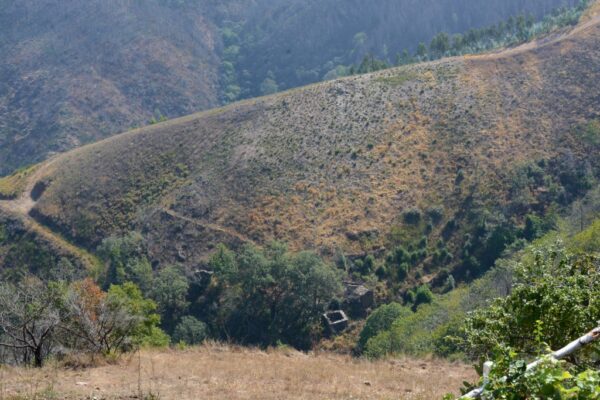
I had my first taste of tree planting at the age of thirteen when my dad came home from work with a poster. On the poster was printed a stylised drawing of an oak and the words, Plant a Tree in ’73. In keeping with the spirit of this venture, Dad had approached the council and asked them to plant a line of trees along a particular stretch of road which lacked even hedges; but the council had dismissed the idea and had even refused to give permission for my father to do the job himself. Typically obedient to even the pettiest laws, on this occasion Dad was not to be naysayed. He raised several score of sapling oak and ash and other trees, and then, one day, he invited me to join him in a tree-planting venture.
To be honest, I thought the whole thing was a ridiculous waste of time. I mean, trees take decades to grow – right? So we were never going to see these things in their full glory. Still, I was always open to any excuse to escape from the chore of doing my homework, and so I went along with Dad and was an accessory to the crime. I also have a dim recollection of our going back, from time to time, with jerrycans full of water.
Well, the years rolled by – and then one day I happened to be passing along that same road, where the fields used to hide behind nothing more than wire fences, and to my astonishment I found that the verge was now lined with an avenue of trees. Ruddy great trees, too!
“Where the heck did they come from?”
Well, duh….!
To paraphrase the oft-quoted line, the best time to plant a tree is when you’re thirteen, but the next best time is now.
Ever since I saw that avenue of spreading oaks and hawthorns I’ve been rather more enthusiastic about the idea of tree planting, but I must confess that I haven’t been anywhere near so effective as I should have been. It’s actually quite hard for an itinerant to plant trees, because unless you stick around and water them, sapling trees tend to die. So, I’ve done the Johnny Appleseed thing, of tossing acorns and conkers into suitable hedges and tossing avocados and mango stones onto tropical verges, but this year was almost the first one since ’73 when I’ve actually dug holes and planted saplings. And, to be honest, so far we’ve only planted a dozen.
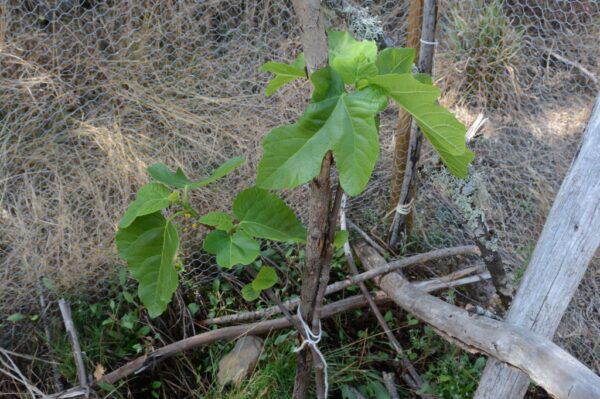
Pathetic. Yes, I know! Utterly pathetic. Didn’t the Chinese army plant a million trees in just one day? That’s the way to do it, of course. We will never be able to get enough trees planted unless we drive our governments to organise massive tree planting schemes. But alongside this, we can all do our own bit, for our own little bits will add up to millions of trees. We be many. So let’s get out there and do it!
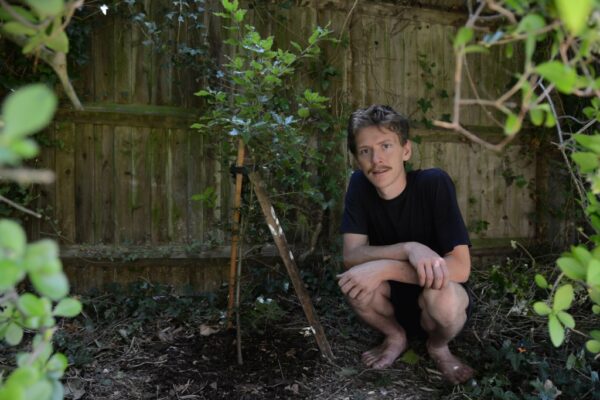
Still, it isn’t as easy as one would wish. First you have to buy the land (which, in our case, has not proved easy), or you have to get the permission of the owner.
Then you might have to prepare the land (and we will certainly have to do a lot of preparation, because our land is steep, stoney, fire-damaged land whose soil has washed away).
Then, unless you have a ton of money to throw around, you also have to raise the saplings yourself.
Besides the dozen saplings aforementioned, which we bought from a nursery and installed in the ground in various places, this past year I’ve also planted some fifty bay berries, thirty acorns, and a handful of yew berries – each one in its own ample pot – and I hope that next time we’re in Europe there will be two-score or more of new saplings ready to go into the ground.
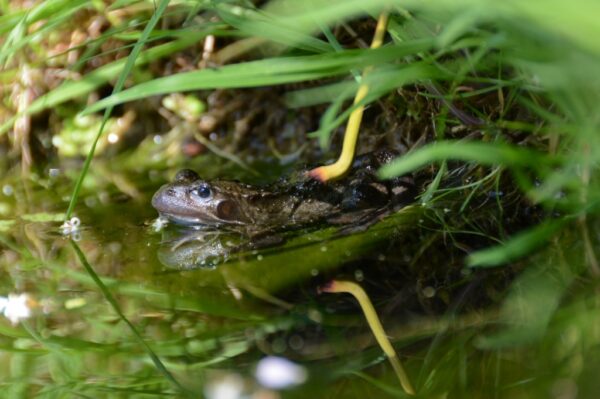
2
All the while that we were tracing the owner of the land which had taken our fancy and were negotiating for its purchase, one other thing was also taking up our time, and that was the fight against Brexit.
What’s Brexit got to do with saving the world?
Well, as I say, the EU is the one organisation which has the potential to apply the brakes to Western civilisation and pass the laws which will help us to wriggle out of this hole. Britain’s departure from the trading bloc weakens its power; and Britain’s departure also signals the immense probability that the nation will tear up environmental protections and delve headlong into the cesspit of untrammelled free-market Capitalism.
So, much as we don’t enjoy that kind of thing, we dutifully joined the anti-Brexit marches and waved our banners.
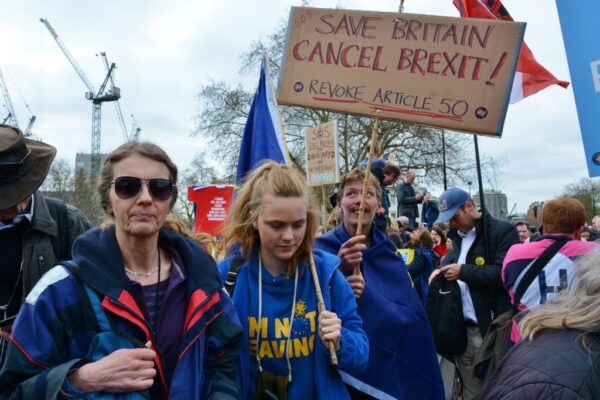
3
The fight against Brexit was emotionally draining, but the thing that took up the most time during this past year was the third part of our project: Extinction Rebellion.
Some time just before Christmas of 2018 there was a strange ‘drone strike’ – or rather, a disruptive drone sighting – at Gatwick airport, and I was probably the person who started the rumour that XR were responsible. Well, I was one of the people anyway. It seemed to me that it surely must be XR – and what a brilliant strategy!
But no. XR disclaimed the deed. “When we do something, you’ll know it’s us,” said the founders of the organisation. “We will stand by our actions.”

XR are the new Greenpeace, for Greenpeace themselves have gone to seed. They travel the world in a state-of-the-art sailing ship; and on the occasion when we met it, the sailing ship was motoring downwind.
XR is the new grass-roots socio-environmental movement – and funnily enough, the people most active in XR are the ones who used to wear Greenpeace T-shirts and try to persuade their parents to buy recycled loo-roll and solar panels. Yes, it’s us lot again! It’s the hippies and the punks! To be fair, the London and Bristol and Brighton divisions of XR seem to consist largely of students and other young people, but amongst the group that Nick and I tried to set up in our home town, and amongst the little group that we eventually joined in the adjacent town, our kids were the only under-thirties. Most of the team were in their sixties.
Come to that, Caesar and Roxanne didn’t really want to be involved in XR, either.
“Why not? C’mon! It’s you we’re doing this for! Don’t you want the planet still to be habitable when you’re our age?”
“It’s too late. We’re stuffed.”
Regardless of the fact that they felt it to be rather pointless, Caesar and Roxanne helped to print XR T-shirts, and they posted posters around the town, and they did their bit when asked to ‘die’ with the rest of the crowd in a symbolic demonstration of humanity’s fate. Caesar even had a go at explaining things to passers-by. The action was taking place in a coastal town which will begin to go under the waves when the sea-level has risen by just half a metre (expected by 2050), and thus it had an immediacy which is often lacking from climate protests. Still, there were plenty of sceptics. When informed by one loutish fellow that global warming was just a hoax, Caesar was able to say, “It’s not, you know. I’ve seen it; I’ve seen what it’s doing to the glaciers in Antarctica and in South America.” However, the best comment of the day came from a man who wanted to bad-mouth Greta Thunberg.
“Sailing across the Atlantic!” he said. “I mean, I ask you! It’s just bloody silly. It’s impossible! No one can cross the Atlantic in a sailing boat!”
“Yes, they can. Lots of people do it.”
“Not in a sailing boat!”
“Yes, in sailing boats. Thousands of people do it every year. I’ve done it myself, several times.”
The man opened and closed his mouth like a fish out of water, and then, as he fled, he said, “And then there’s Brexit!”
We had no difficulty in guessing which way he voted on that one.
Caesar and Roxanne were not around for the second XR action in London, because he had gone to work in Antarctica on a sailing yacht and she had just started university. So, for the first time in 28 years their parents were alone; and alone we went, with half a million others, to stand in the road outside Downing Street. It was Nick’s 64th birthday and he wore a sandwich-board, one side of which was emblazoned with a slightly corrupted version of the song. It said, “When you get older, losing your hair, when you’re 64, will the world still be habitable?”
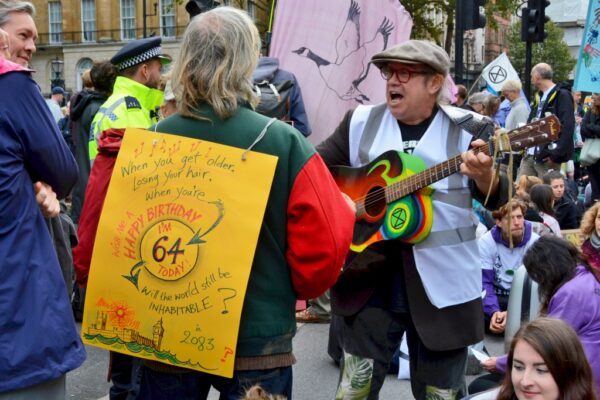
The other side of the board said, “The End of the World is Nigh – unless someone like you cares a whole awful lot.”
Several people wished Nick a happy birthday, and quite a few sang the song with us; but they were all already members of the choir. The government, in their ivory tower, ignored us. I think that was the day that Boris Johnson called us crusties. None of us had (or has) any idea what a crusty is, but the next day we were all wearing badges with I’m a Proud Crusty written on them.
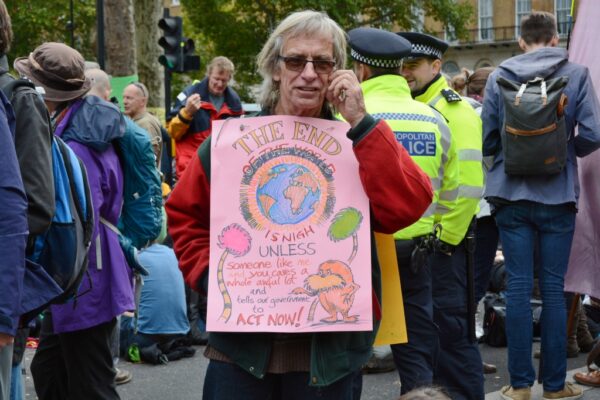
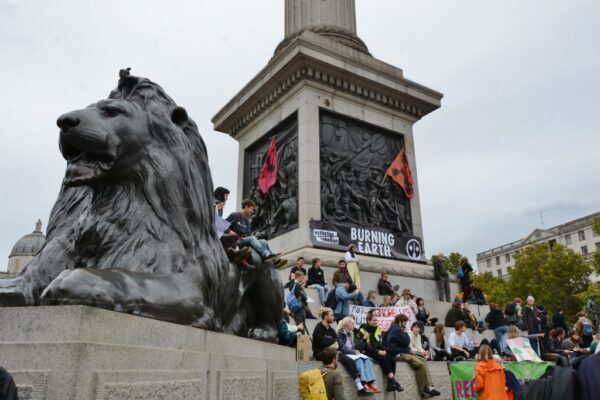
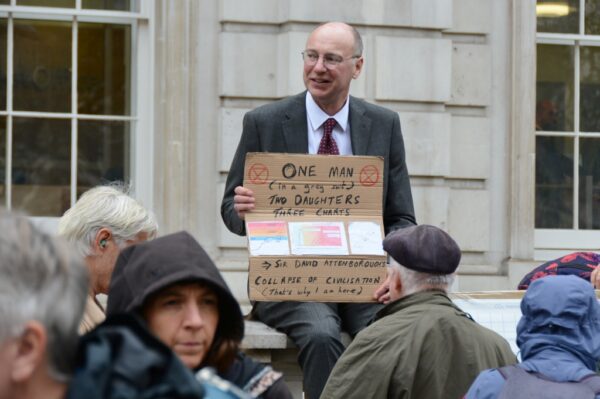
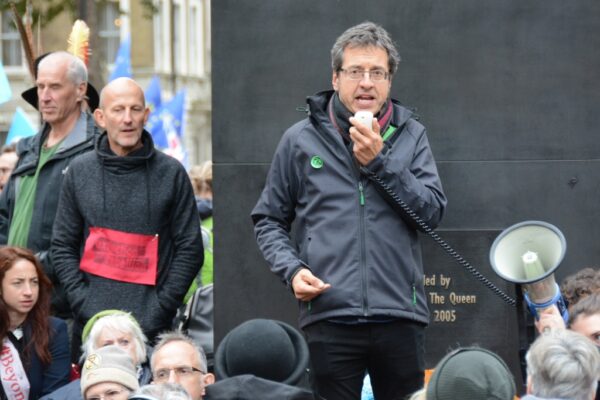
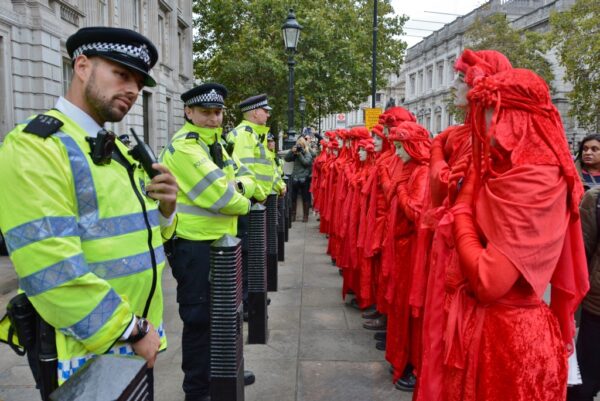
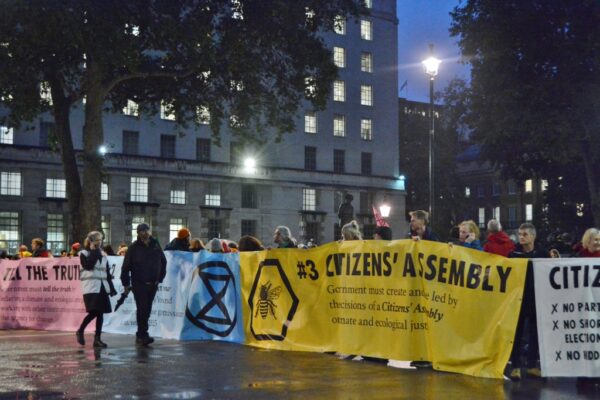
Eventually, the police were successful in moving us all along. Friends who had camped in Whitehall had their tents trampled and torn down, and those who were willing were arrested and then freed and then – eventually – acquitted; because it turned out that the arrests had been illegally made.
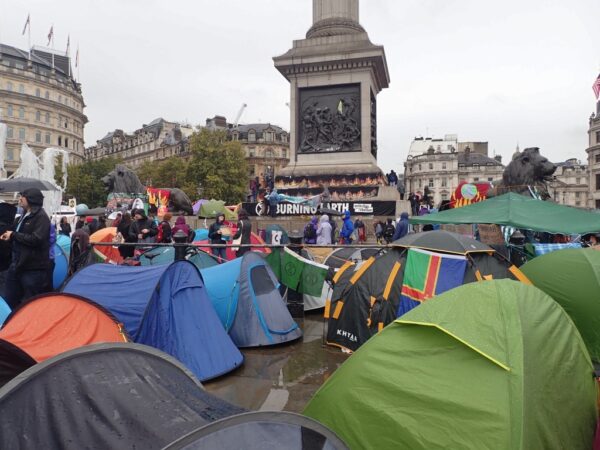
A few days later we all took part in an enormous funeral procession, mourning the death of the ecosystem; and a while later, some of us undertook a week-long ‘hunger strike’, eating nothing and drinking only water. Some of the participants sat outside Parliament with placards – but London had returned to normal and no one paid them any mind.
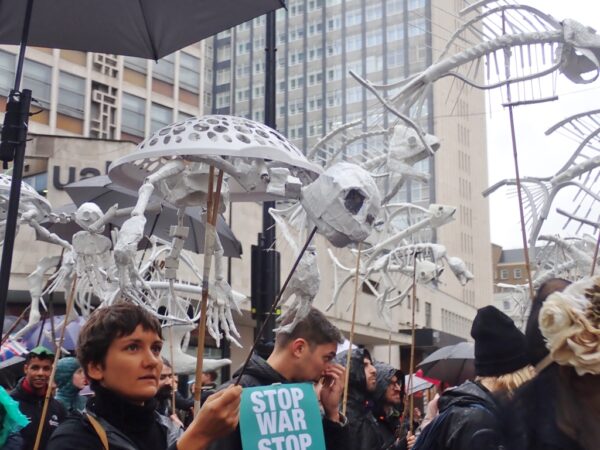
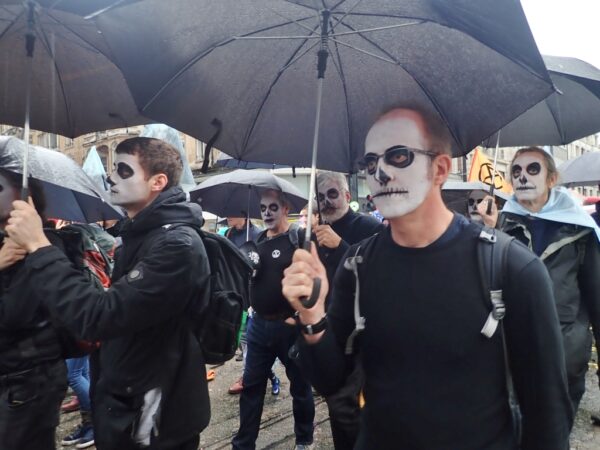
Did we achieve anything with our protests?
Yes. We got the world to sit up and take notice, and we got three of the four political parties in Britain to come up with very ‘green’ manifestos in which they promised to do all sorts of wonderful things, such as planting millions of trees. But, alas, we did not exact any such promise from the Tories – and, as such, we have not yet achieved enough.
From there on, it was all downhill. We yelped with dismay when the Lib-Dems gave Boris Johnson the election that he craved; and we groaned and felt real physical pain when the Tories got the majority that they sought. This win spells the end for Britain’s membership of the EU, but worse still, it spells doom for the environment.
Of course, the whole thing was down to the gutter-press, who brainwashed the dim-witted. And of course, the whole thing was very fishy. (A one percent increase in the vote share buys a hundred more seats…? And what about those postal votes, eh? Why were they opened before the election day? And how can it be said that the people voted for Brexit when only 43% of the electorate chose the Tories and 53% of the voters put their cross next to anti-Brexit parties?)
Still, the whole thing was also very predictable – and, seeing this, by the time it happened we had already fled from the crumbling ruins of the kingdom. Britain might leave the EU, but we’re jolly well not going to. We’ve planted trees in the EU, and we’ve planted our hearts and our feet there, too.

But as a matter of fact, by the time Boris Johnson lied and cheated his way through to something which his propaganda machine called ‘a landslide victory’, Nick and I were not even in Europe. We were back on the boat. A few days later, we embarked over the trackless ocean.
Over an empty ocean.
Over a blue desert.
A week out, we passed a fishing boat and spoke to the captain. He was returning home with a thousand tons of tuna – a cargo worth a million dollars to the ship’s owners – but it had taken him three months to round up this catch, whereas, he said, it used to take less than one. The fisherman also told us that the catching of a ton of tuna involves five tons of ‘by-catch’; which is to say that, for the 1,000 ton treasure that he and his crew had amassed, they had also trashed and removed from the web of life 5,000 tons of other sentient beings.
If dolphins and turtles and fish have a religion, you can bet that Homo sapiens is its dark, evil force.
Surely, the powerful people who could save this world know what they are doing? The men who could pass the laws which would save the ocean and the rainforest know full well what needs to happen – so why aren’t they doing anything? Bolsonaro and Johnson and the rest of them are ignoring the crisis despite the fact that they know what’s coming our way. It doesn’t make sense, does it? Unless…
Unless they’re buying a rocket-ship and heading off to Mars!
We have not given up hope. We have not given up trying to do our little bit to help to save the world. We will be back to prepare the land and plant those trees, and we will be back to wave our banners with XR. We recommend that you do, too – because however well equipped and seaworthy your boat is, you can’t sail to Mars. Fighting to save the world that we have is the only option.
STOP PRESS:
This article was written before the coronavirus outbreak became a pandemic. I need hardly point out that those of us who have our own wind-driven, international transport are at a considerable advantage at the moment. We can sail away from the black-spot areas, and if the authorities in our new venue throw us out, we are equipped to move on. Mind you, we may not want to move on… And we can’t really escape. At the end of the day, we ‘yotties’ are still stuck on the same planet as everyone else; so let’s not forget that the current crisis is temporary, whereas the one we’re hurtling towards will be far more far reaching and it would be permanent.
The end really is nigh – unless we DO SOMETHING to stop the train.

AIDS, MAD COW DISEASE, EBOLA, SARS, LISTERIOSIS and now COVID-19.
ALL of these outbreaks can be traced back to the consumption of meat, animal for slaughter husbandry systems and the mass production of meat products. Despite the very clear warnings that Covid-19’s predecessors were linked to our carnivorous practices, human behaviour has not changed.
Very topically Albert Einstein is quoted as saying:
“Nothing will benefit health and increase the chances for survival on Earth as the evolution of a vegetarian diet”.
( He also said that “Insanity Is Doing the Same Thing Over and Over Again and Expecting Different Results” ).
Is it time for us to heed the clarion call to ‘stop eating clarion’ ?
Have a think after reading the following gem of a poem:
The Pig – by Roald Dahl.
In England once there lived a big
And wonderfully clever pig.
To everybody it was plain
That Piggy had a massive brain.
He worked out sums inside his head,
There was no book he hadn’t read.
He knew what made an airplane fly,
He knew how engines worked and why.
He knew all this, but in the end
One question drove him round the bend:
He simply couldn’t puzzle out
What LIFE was really all about.
What was the reason for his birth?
Why was he placed upon this earth?
His giant brain went round and round.
Alas, no answer could be found.
Till suddenly one wondrous night.
All in a flash he saw the light.
He jumped up like a ballet dancer
And yelled, ‘By gum, I’ve got the answer! ‘
‘They want my bacon slice by slice
‘To sell at a tremendous price!
‘They want my tender juicy chops
‘To put in all the butcher’s shops!
‘They want my pork to make a roast
‘And that’s the part’ll cost the most!
‘They want my sausages in strings!
‘They even want my chitterlings!
‘The butcher’s shop! The carving knife!
‘That is the reason for my life! ‘
Such thoughts as these are not designed
To give a pig great peace of mind.
Next morning, in comes Farmer Bland,
A pail of pigswill in his hand,
And piggy with a mighty roar,
Bashes the farmer to the floor…
Now comes the rather grisly bit
So let’s not make too much of it,
Except that you must understand
That Piggy did eat Farmer Bland,
He ate him up from head to toe,
Chewing the pieces nice and slow.
It took an hour to reach the feet,
Because there was so much to eat,
And when he finished, Pig, of course,
Felt absolutely no remorse.
Slowly he scratched his brainy head
And with a little smile he said,
‘I had a fairly powerful hunch
‘That he might have me for his lunch.
‘And so, because I feared the worst,
‘I thought I’d better eat him first.’
I love the poem!
Brilliant poem! Thank-you for that, Chris.
Essentially, I agree with you about meat consumption – and, indeed, if we were not all so hardened against haphazard coincidences, mankind would surely read a ‘message’ in the fact that coronavirus is an anagram for carnivorous! However, although this family is vegetarian and is doing its best to become vegan, I must confess that I have begun to wonder whether our stance contradicts reality.
I find myself bitterly regretting the fact that evolution didn’t help us into becoming a solar-powered species. (Or, to put it in religious terms, “I wish that Intelligent-Design hadn’t imposed a system whereby animals have to eat each other. Why didn’t he design us all to live on grass and love one another?”… ).
Having regard for the fact that Homo sapiens CAN’T survive without vitamins which only occur naturally in animal produce, I find myself torn between a desire not to cause suffering to animals – coupled with a recognition that animal farming causes a huge amount of environmental harm – and the need to be realistic about our state of being. ie. We need vitamin B12, which is available from eggs and cheese and from meat but which is not found in any vegetable source excepting concentrations of yeast. (Yeast is actually not a plant, within the meaning of the act; but that point is rather moot).
We recently heard from a woman who farms beef cattle somewhere in Canada, and whilst I certainly couldn’t do her job and could not even bring myself to eat a dead cow, her description of her day’s work certainly made me feel that my connection to the seasons, to food production, and to the natural cycle of birth-life-death is vastly inferior to hers.
Life is a complicated game – or, as Hippocrates famously wrote: “Ars longa; vita brevis”. We are now running out of time to get it right.
I am certain that the right answer doesn’t involve factory farming or slaughtering wildlife in its last few refugees on this Earth, but simply becoming vegetarian or vegan is not enough either, because any kind of industrial-scale farming involves trashing the environment.
Point well spoken. I wishyou success
S/Y VOR
I belong to the english organisation population matters.
It is a great outfit in the usa there is the ford foundation it is doing simalar work but more activist.
I always say that all problems in the world today are directly related to overpopulation.
Good luck with your efforts.
Over-population is definitely a major problem. But I think that excessive greed and corruption are an even greater problem; and, unfortunately, I think that the greedy and corrupt are far more likely to survive the social and environmental collapse which is coming our way.
Jill
So good to have news from the Mollymawk familly !
Congratulations for the changes in your life, where I recognize most of my own intentions.
Skol reached france in august 2019 and I feel so glad to be here to live through the current events with my next of kin.
I started my training in “natural agricuture” and “food forestry” but have not yet bought land, unfortunately.
Have a safe sailing back to europe !
kind regards
Isabelle
It’s lovely to hear from you, Isabelle. I’d been wondering what you guys were up to. Maybe you’ll be able to give us some tips about ‘food forestry’.
Hugs to both of you.
Jill
The question arises as to where to plant the trees. The oxidation of wood in fires produces carbon dioxide. Perhaps trees would be better grown in regions less susceptible to fires. High latitudes and wet equatorial regions?
https://www.dn.pt/lisboa/lisboa-verde-mais-de-4500-pessoas-plantaram-20-mil-arvores-na-cidade–11698112.html
http://www.100milarvores.pt/
Well, I don’t know about that, Fernando. After all, you can’t get very much further north than Canada, and they’ve had plenty of massive forest fires. Southern Australia is also fairly far south, and we all saw what happened there, recently.
I think the important thing is to replant the trees, everywhere where there have been fires – and everywhere else, too!
Thank-you for the links.
In addition to carbon dioxide from cellular respiration, an adult human on an omnivorous diet produces about 3 litres of methane per day. A total of 21 million cubic metres of methane per day for the present human population. It comes from the fermentation of fermentable fibre in the gut. A subject on an entirely carnivorous diet will have little or no fermentable fibre to produce methane. The greater the proportion of plant material in the diet, the greater will be the production of methane.
Your argument is fallacious because a carnivorous diet consists of eating herbivorous animals.
This is bad for two reasons:
Other animals farmed for meat (pigs, chickens) are bad for the same reasons, though to a smaller degree.
For these reasons the meat industry, and the beef industry in particular, are the largest worldwide contributors to greenhouse gas emissions and to the climate breakdown.
How does a non-scientist, someone with no faculty for science or mathematics decide which scientists to believe? Do you just believe the politicians who tell you that 97.39% of climate scientists agree? Or do you believe organisations like Greenpeace which seem to hold the same values as you do? How do you avoid being fooled by your own confirmation bias? Those dopamine hits on your nucleus accumbens.
Who funds scientific research? What is their objective?
As a funder, would you continue to fund science which did not further your objectives? As a scientist, would you always be scientific, or would you feel obliged to bias your research and results towards pleasing the funder, so as to get another research grant?
It has been noted over time that in all scientific fields a leader emerges. Not necessarily the most brilliant, sometimes just the most powerful, charismatic personality, but they lead the entire field in their chosen direction and the field follows, until the leader dies and another emerges to lead the field off in a different direction. I believe that 97.39% agree because that is what always happens in science. The people to really listen to are often the mavericks.
Homo sapiens has been around for at least 300,000 years, through three full cycles of glaciation and interglacials of the present Quaternary ice age, which began 2.58 million years ago. If you expand your time horizon beyond that of your own life and that of your children it´s more difficult for others to control you with fear.
Some people convince themselves that other species are more important. We have to be extremely cautious in encouraging that train of thought. The Colombine school shooters left journals explaining their reasons, that people were unfit to steward the planet and that the earth should be left for the other animals.
You ask some interesting questions, John.
It’s true that it can be very very hard to know who to believe. One clue is to look at what is nowadays called ‘the money trail’.
Which is the more likely scenario: On the one hand, 97.39 percent of scientists might be mistaken in their combined researches – (or they might all be lying to us, just for the fun of it!). On the other hand, a tiny group of very rich people with a lot to gain from keeping the status quo might be trying to persuade us that that everything is hunky-dory.
Another clue is to use your own eyes. If you have seen glaciers retreating at an unprecedented rate, you don’t actually have to take anybody else’s opinion on the matter.
(For the lack of this opportunity, I recommend watching films which document this retreat with still photographs and video footage. eg. Chasing Ice)
One avoids ‘confirmation bias’ by keeping an open mind and questioning all the time.
To use the example offered by the current pandemic – much as I despise the Tories and am appalled at their deliberate mishandling of the coronavirus crisis, I note that direct comparisons with certain other places are irrelevant. In particular, Jacinda Adern has handled things very well, but although NZ and GB are much the same size, to pretend that the situation could have been contained in the same way is naive, not least because the UK’s population is 14x bigger than NZ’s.
Returning to the matter of global warming – the fact that Homo sapiens existed 300,000 years ago (and more) is not relevant. The changes occurring now are happening at a speed unprecedented in the entire history of our species – and indeed, so far as anyone knows, in the entire history of the planet.
They are happening far faster than the changes which wiped out the dinosaurs.
Your last paragraph seems to us to be a non-sequitur being totally unrelated to anything in the article.
All the best,
Jill
The Economist weekly newspaper, which could not be more pro-EU and pro-UK membership, reported before the EU referendum that none of the EU27 states wanted Brexit to happen. ´The Germans don´t want to be left with the French, the French don´t want to be left with the Germans and everyone else doesn´t want to be left with the French and the Germans´ as they put it. In fact, if the EU is to have any chance of completing the stated goal of ever closer union, of political, currency and fiscal union, it was essential that the UK leave. I suspect that many of the 16 million who voted against Brexit have no knowledge or understanding of the EU, its history, its structure, its institutions and how they operate, nor of the political and economic evolution in Germany, France, Italy and Spain since the adoption of the euro. They have no sense of the deep philosophical divides between the peoples of the protestant north and catholic south, between the, at least formerly, Atlanticist west and the post-soviet east, of the German Kantian view and the French of Voltaire. Perhaps they go through life dreaming of yellow brick roads and humming ´Somewhere over the Rainbow´ to themselves. Do they know for example, that 3.64 million Spaniards voted in November 2019 for a return to the values of the Franco dictatorship? But regardless, what stops the 16 million from simply moving back into the EU if they view that as optimal for their own educational, professional, cultural development and life prospects? Most of the EU27 states are actively competing for readily integrateable european immigrants to bolster their falling and ageing populations due to persistently low birth rates since the mid-1970s. Already in Germany 22% of the population is over 65 years old. The economic old age dependency ratio is 42%. Both figures are rapidly rising. In Italy and France the eoadr is 60% and 50% respectively, and rapidly rising.
https://ec.europa.eu/info/sites/info/files/economy-finance/ip065_en.pdf
Hola Pablo,
Thank-you for your input.
You ask, “What stops the 16 million from simply moving back into the EU if they view that as optimal for their own educational, professional, cultural development and life prospects?”
Basically you are asking, what is to stop a quarter of the population of Britain from moving to Europe? It is, of course, a completely ridiculous idea for millions of people to suddenly up-sticks, like refugees, and relocate to countries where they don’t even speak the language – but I will give you a reply:
A great many people have moved, but most can’t move (for a wide variety of reasons), but, more to the point, why the hell should people have to leave their homes and their homeland in order to retain their EU citizenship?
For us, aboard Mollymawk, the situation is rather different. Three fifths of the crew have never resided in the UK for more than a year at a time – two were not even born there – and the other two fifths abandoned that ship decades ago, long before it began to sink, and have never felt any urge to return. We have no reason to want to live in England and many reasons for wanting to put down roots in Europe, Brexit being only one part of the equation; but our situation is far from being normal. Why should a person who was born with EU citizenship and who loves the country where he/she was born be OBLIGED suddenly to sell the house and the car, find a new job, learn a new language, and abandon family, friends, local countryside haunts, and the local pub, merely to retain his rights? Why should the whims of the other half of the population bring about this upheaval? Should 16.8 million people (or, as it now seems to be, some 30 million people) be turned into refugees simply because a newspaper tycoon and a bunch of crooks in Parliament have conned the less well-educated into ticking the wrong box, on one particular day almost four years ago? Does this suggestion really seem reasonable to you, Pablo?
Moreover, what leads you to suppose that the people who would be willing and able to up-sticks in this way are likely to be under 65? It is true that the polls suggest that young people are more likely to be pro EU than older ones, but of the people I know who have relocated, outside our own family only one is under 50 years of age. Thus, I am not at all sure that the sector which is willing and able to relocate is the sector which is sought by our continental cousins.
“Britain might leave the EU, but we’re jolly well not going to. We’ve planted trees in the EU, and we’ve planted our hearts and our feet there, too”
Well done, but where are you going?
Europe like nearly everywhere else is in lockdown!
´It´s too late, we´re stuffed.´ Millenial war cry.
I used to think that the problem was that the post-war baby boomers made exceeding poor parents of parents. Then I listened to the Boyan Slat interview with Joe Rogan and learned that not all millenials are such defeatists. Some choose not to see themselves as victims, but to grab the bull by the horns, to worry it relentlessly like a terrier until it finally submits to the tenacity of spirit, the boundless energy and the naïvity of youth. Naïve, youth doesn´t know that things are complicated, things are difficult. Youth just dives in, headfirst. No parachute.
And young Slat is well on the way to engineering a solution to the plastic trapped in the surface ocean gyres. Now he´s moved on to tackling the problem at source, in the rivers.
The issue of the micro-plastic particles, which may or may not be a problem, remains for some other enthusiast.
Waving placards at others is much less effective than an education in engineering.
https://theoceancleanup.com/
Where do we draw the line between a defeatist and a realist, Frank?
And if a person has examined the evidence and has arrived at the conclusion that there is no hope for humanity, can we really expect for her to devote her life to solving problems which she perceives to be insoluable? Is it not more likely that she will prefer to pursue happiness by some other means?
Like Greta, Boyan Slat was in the right place at the right time and his idea is therefore bearing fruit. (One wonders how many other talented people have had their ideas and their words fall into a vacuum…) Slat’s invention seems good. The basic idea seems utterly obvious and yet at the same time, wonderfully naively optimistic. (“You want to clean up the WHOLE ocean???”) However, as I’m sure you are aware, there are plenty of biologists who don’t see the Ocean Cleanup in such a positive light. One problem is that removing all the solid matter from the top few feet of the ocean removes tons of plankton; and the plankton are as vital as the plastic is deadly.
This is from the Guardian, from an article called ‘Too Good To Be True?’:
“In a September 2015 blog post, 5 Gyres, an activism, research and education nonprofit dedicated to issues of aquatic plastic pollution, pointed out that buoyant organisms like Velella velella or purple janthina snails that float along on the surface would likely not be able to flow beneath the array’s screen as planned. “The potential for ‘bycatch’ is too great to be ignored,” 5 Gyres writes.
…
The Ocean Cleanup’s array, as deep-sea biologist Andrew David Thaler wrote on SouthernFriedScience.com, is also a fish aggregating device. As the v-shape concentrates plastic debris in the center, it also has the potential to attract predator and prey species, disrupting their normal behavior or migration patterns. It could also make them more susceptible to consuming the plastic accumulating in the array.”
https://www.theguardian.com/environment/2016/mar/26/ocean-cleanup-project-environment-pollution-boyan-slat#img-1
Stopping the plastic at source, in the rivers, seems like a much better idea. I gather that most of it originates in China – so perhaps we need a Chinese Boyan Slat! Then again, perhaps we just need to persuade the Chinese government to take the matter seriously. After all, netting the rivers to stop the rubbish from reaching the sea is not a new concept, and it doesn’t require the level of complex engineering involved in Boyan’s original invention.
Incidentally, Boyan Slat is the wrong name to choose if you want to advocate the idea of getting a degree. He invented his machine while he was still at school, and although he subsequently started a degree in engineering, he dropped out to build his machines instead.
I can’t agree with you on the subject of ‘placard-waving’ versus higher education. Most of us are not mentally equipped to be engineers or scientists; but in any case I would argue that although the scientists are the ones who identify the problems, the placard-wavers are the people who grab the attention of the world, forcing governments to take notice and encouraging the ‘Boyan Slats’ to put their minds to the problem. Thus, I see both types as essential.
I’m inclined to suggest that there is no reason why the two types should be mutually exclusive – but, then again, I’ve heard lately of people who have abandoned degrees in Environmental Science in order to be able to spend more time actively tackling the problems via XR (ie. by ‘placard waving’, as you would have it).
At the moment, Roxanne evidently still feels that it is worth her while to pursue her studies, and perhaps she will eventually be able to put them to good use; however, I have to say that the few snippets which reach my ears tend to suggest that her tutors do not find our situation hopeful. Likewise, my nephew, doing a PhD in Ocean Acidification, has nothing good to report, and nor do our other young friends, studying Marine Biology and related fields.
“Exponential warming” – “Soil exhausted within ten years” – “Acidification causing the ocean to fail as a carbon sink”…
It seems that much of the information supplied to the millenials by the experts is reinforcing the idea that we’re stuffed.
On Yom Kippur we atone for our our sins. We say that we have sinned, we apologise and then we say that we´re sorry for pretending to atone for our sins when actually we´re not sorry at all.
That´s what this is.
One or two meetings with like minded people. An afternoon larking about in front of the Palace of Westminster. Then return to a life of leisure, expressing oneself in hai ku and watercolours, living on inherited wealth.
Like those wasteful, hedonistic folks brimming with virtue at the recycle bins.
Ari, you need to get along to a protest and meet some of these people; or perhaps join a local group. When you do, you will discover that your imaginings are totally awry.
XR protests have absolutely nothing to do with atonement for sin; they are not guilt trips. And these people are most certainly not just going along for the party and then getting back on with life. As I’ve said in the article, involvement with XR took up most of our time last year and was very stressful. Most of those who participate do not enjoy it; they are involved because they feel that this is a last ditch effort.
For what it’s worth, in the aftermath of the UK election, where the people re-elected the crew who are currently doing sod all to help diminish the environmental impact of Homo sapiens, many XR people have given up the effort to save civilisation and are now focused on personal survival or, in more pessimistic cases, on what you might call, How to Die Gracefully.
´That unmatch´d form and feature of blown youth
Blasted with ecstasy.´
is a first thought when we look at those scarlet ladies of XR. Different uniform, greasepaint now but psychologically, they haven´t left Woodstock You could imagine them emerging from a ranch with the Manson Family. They´re still camped on Greenham Common.
There´s always been something in them of a yearning for the lost, carefree days of the kindergarten. Crosslegged on the ground in a circle, holding hands and singing songs to each other.
If there´s a lesson here, it is that the hippy movement was a dead end in terms of personal cognitive development. A trap.
Adopting simplistic ideologies so extreme that if they are to work, require everyone else in the world to adopt them, is sure to end in disappointment. Yet, one wonders if that really matters to them. They have found a community, a sense of belonging, there is a security in that, a comfort.and there´s even a sense of shared purpose if they blind themselves to the futility of their actions.
Deeper than that, perhaps the hidden, inner acceptance of the futility creates an endless path for life. Forever protesting. Plus, it´s all someone else´s fault. So it´s a trap, blocking any personal progress forward in the world.
They must occasionally wonder what would happen in the terrifying event they were ever granted their demands. They would lose their purpose, their raison d´être and risk falling into depression. Maybe the appeal of activism is something like that of a suicide cult that carefully avoids the interesting bit, the dramatic final act.
(´Chaos – Charles Manson, the CIA and the secret history of the 1960s´ by Tom O´Neill (published 2019 after 25 years of research))
Hullo Susan,
I think you need to get along to an XR protest and meet some of these people. They are not what you think they are.
For starters, I’ve only ever encountered one ex-Greenham protester amongst the XR people; and she was not much involved. For almost all of the XR people that I’ve met, this was the first time that they had made the effort to get up and do something about our situation. They are, by an large, well-behaved middle class citizens. Up until now, they have been hoping that the Western governments will pull us through.
Secondly, they are very much NOT inclined to blame somebody else. On the contrary, most are very hung up on their part in the destruction of the environment.
This one won´t make it past the censors. I recognise myself years ago in your state of mind I hope though, that you do read this through and consider it seriously, if only for your daughters´ sakes. My vegan extremism caused sterility and lasting physical disability due to the sustained lack of essential nutrients. Sure we can get away with it for five years or more but eventually it gets us.
I wrote a book after my experience and the enlightenment it brought. You can read the first chapter on my website; http://www.lierrekeith.com/book-ex_the-vegetarian-myth.php Please take a look and see if it makes any sense. Extracts;
´Those impulses and ignorances are inherent to the vegetarian myth. For two years after I returned to eating meat, I was compelled to read vegan message boards online. I don’t know why. I wasn’t looking for a fight. I never posted anything myself. Lots of small, intense subcultures have cult-like elements, and veganism is no exception. Maybe the compulsion had to do with my own confusion, spiritual, political, personal. Maybe I was revisiting the sight of an accident: this was where I had destroyed my body. Maybe I had questions and I wanted to see if I could hold my own against the answers that I had once held tight, answers that had felt righteous, but now felt empty. Maybe I don’t know why. It left me anxious, angry, and desperate each time.´
`I’m going to walk you through this. Carnivores cannot survive on cellulose. They may on occasion eat grass, but they use it medicinally, usually as a purgative to clear their digestive tracts of parasites. Ruminants, on the other hand, have evolved to eat grass. They have a rumen (hence, ruminant), the first in a series of multiple stomachs that acts as a fermentative vat. What’s actually happening inside a cow or a wildebeest is that bacteria eat the grass, and the animals eat the bacteria.´
(I see I was still lost up my own asshole when writing the book. ´I´m going to walk you through this´! Of course ruminants don´t ´eat´ bacteria. Their gut bacteria hydrolize and ferment plant polysaccarides into acetate, butyrate and propionate fatty acids and the ruminant absorbs the fatty acids.)
Love. Lierre.
I personally hold a great grudge with Greenpeace. With the amount of nuclear development they halted, and the plants that were prematurely closed due to their interventions, they might be responsible for greatest amounts of greenhouse gas emissions as a total.
We had a partial solution to the climate crisis years before we started talking about it. Nuclear was to be the power of the future. But then the nuclear scare came around after Chernobyl, and Greenpeace drove the good idea to the ground. Had Germany invested the same money they did invest into renewables, their electricity would be almost zero-emission now. Instead, they spent billions, and when the weather ain’t right they are among the highest emitters in the EU.
Renewables are perfect for individuals – to put on your roof, boat, camper, etc. Then you can design your own system where you match your demand with your supply, and this can work with some small scale battery bank. Or if you are a state that can build a lot of hydro that can act as storage, generating when the other renewables aren’t, storing water when they do.
Otherwise you just end up using natural gas a lot. And considering natural gas comes either from authoritarian Russia, from environmentally risky fracking in the US, or from politically unstable middle east, it basically means that going heavy on renewables as a state is just greenwashing.
So I hope XR is not ‘the new Greenpeace’, but maybe “Greenpeace that thinks logically”.
And on tree planting – it might be easier to buy an existing forest just to ensure it won’t get cut down. If you cannot plant a lot yourselves, your money can be better spent conserving what we have.
And if you want to focus only on CO2, then the best method is to cut down tiny parts of a forest and replant every few years, so that the forest constantly produces wood. This wood then goes into construction, furniture etc, where it will be a store of carbon for at least a few decades (possibly over a century, if handled responsibly). The downside is that such forest becomes a “wood plantation” so it will not support biodiversity too much. But it will be slowly sucking carbon, while natural biodiverse forest will eventually cap out – whatever growth will happen in one place of the forest, will be equalized by what animals eat in another.
I personally wonder if (or when) we will get a popularization of climate mitigation in addition to climate preservation. I mean, the average surface temperature is not the problem – the extremes are. You could heat your home with summer sun if winter, if you had big enough tanks of salty water in the basement, and a heat exchanger on the roof. If we all started doing that, we would get cooler summers and warmer winters. The ice caps melting is a problem cause white ice reflects more heat than dark water. But we still often have our roofs black, and barely any are painted white. There is so much to do that could mitigate climate problems just to give us some more breathing space that does not tie directly to CO2, its hard to understand why no one mentions the supportive actions we could do.
Interesting post. There are a few things missing, I think. My personal view is that of all the things killing our world, “Churn” is one of the worst. We are (in our land life) using a dryer that is 40 years or so old. It has been repaired a few times now and each time the opportunity was there to buy a new one…. only one problem. A new one has a lifetime of about 7 years… so I have saved the world from the hurt of mining, building, transporting, storing, etc. 5 or 6 new dryers. In my youth, the average “half-life” of a car was 20 years, that is, of all the cars built in 1950, 50% were still on the road (licensed) in 1970. Since then much effort has been made to reduce this and now the half life of cars is less than 10 years. So, if I can keep my IC powered car on the road (it is 10 years old now) for another 10 or more years, I will leave a much smaller “carbon foot print” (not to mention all the other foot prints required to build new cars) than if I buy a new electric car that I will need to replace in 7 or 8 years (not to mention that they are so far over priced as to make one homeless…. maybe not such a bad thing). Take something simple like LED light bulbs, they should be able to last pretty much forever…. I still have LEDs in 30 year old equipment that work fine. But 2 or three years is considered good service for an LED lamp. Except in Dubai where they must legally last at least 20 years… and they do. We (people) can build things to last many times longer than they do and to be repairable (yes even light bulbs). We have done it before. Packaging can be reduced.
What could be done (but is unlikely to happen)? Require a minimum 20 year warranty on all major items, Extend the length of time a company must provide spare parts to 30 years, cap the price of those parts to a reasonable percentage of the original product. All maintenance information should be available on line (with no paywall) of course, At 25 years old, all specifications for all parts (including schematics and code for computer and electronics modules) should be made open source and easily available online with no paywall. So that people can make their own parts (3d printers are a thing and can be made to use recycled materials). As in the custom car business, I would expect numerous “after market” parts to become available for less than people could make their own but in both cases, the replacement parts are likely to be better than the original.
Such laws could easily be drawn up and used but any politician even suggesting would basically end their political career pretty much instantly. Any media personality suggesting such a thing is likely to end up similar to Boeing whistle blowers, dead.